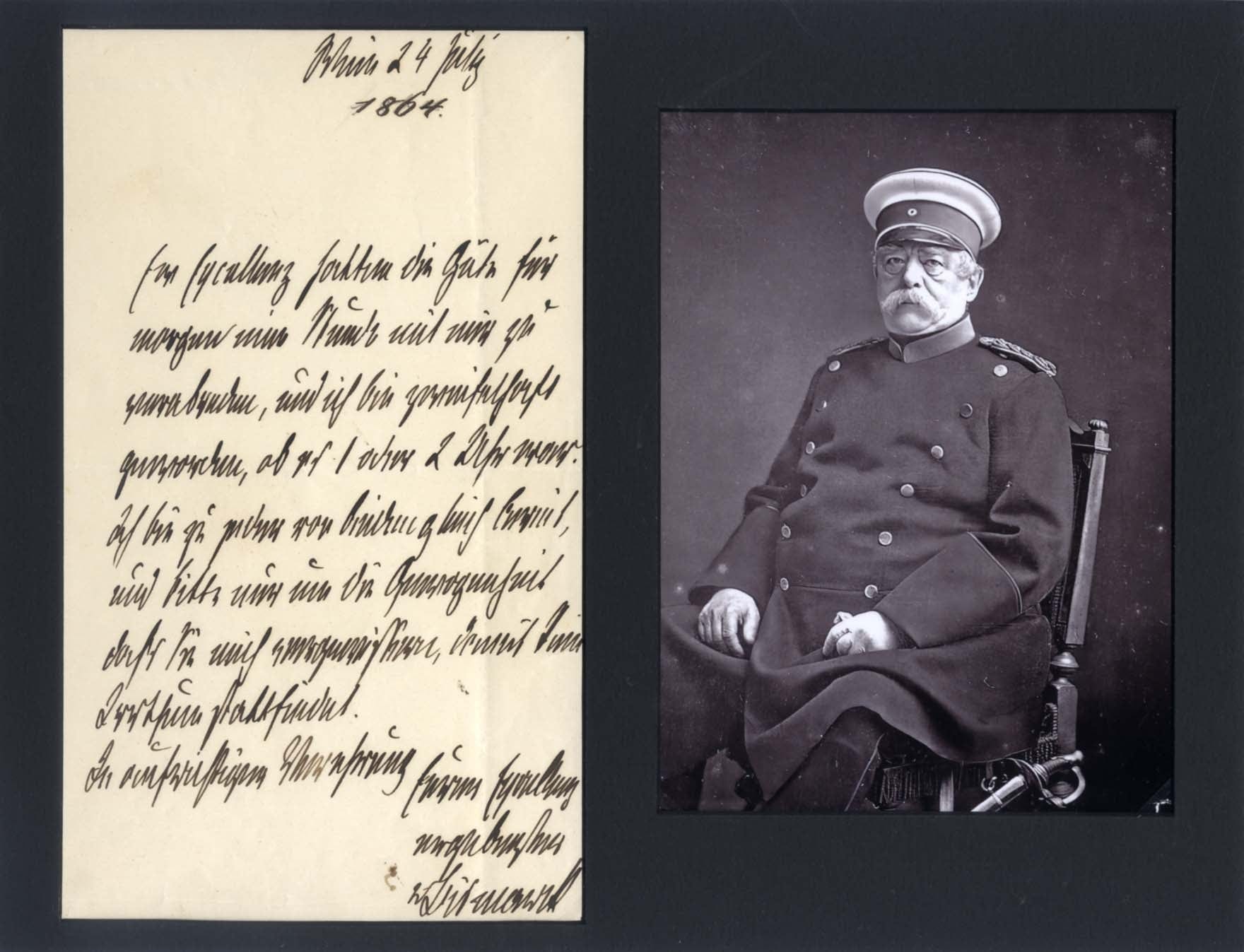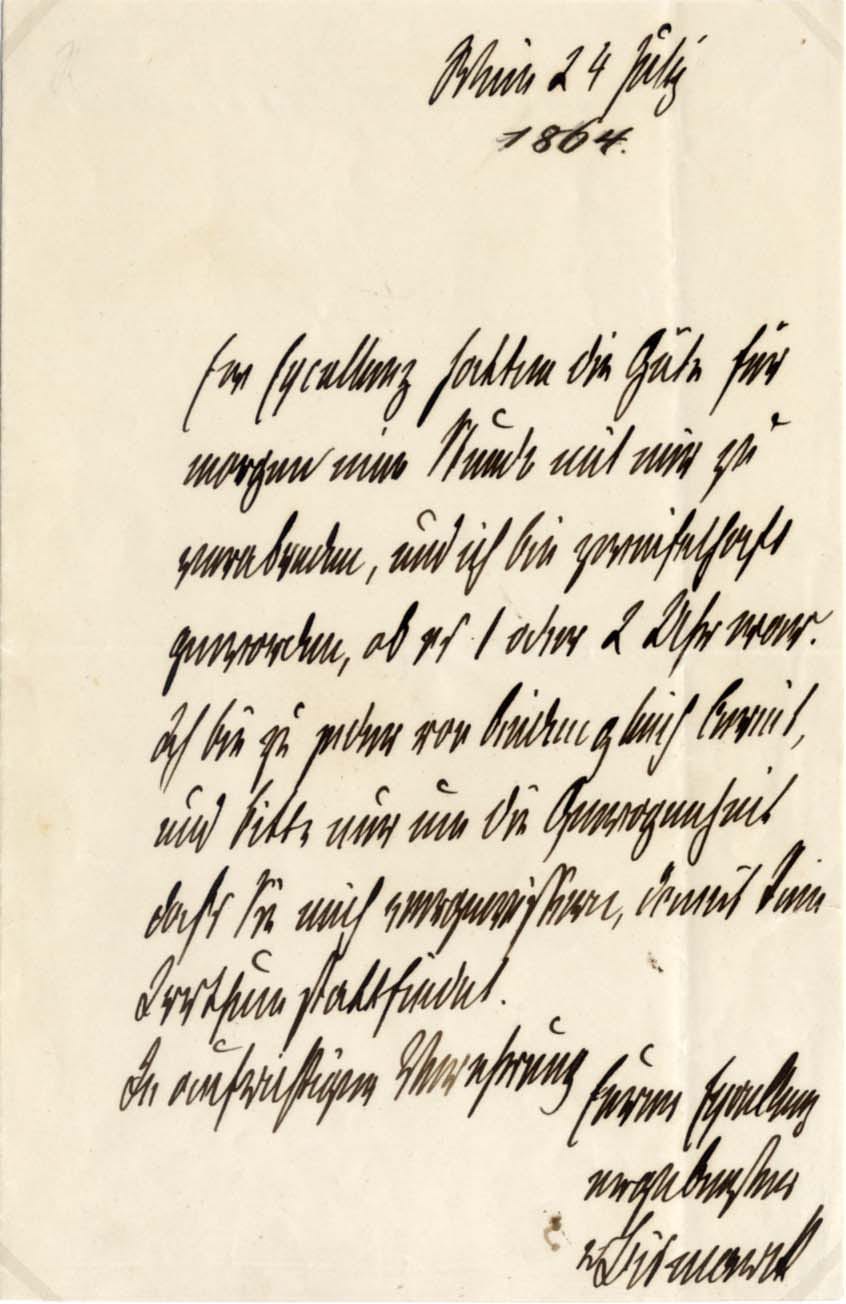Description
Autograph letter signed, one page, 5,5 x 8,75 inch, Vienna, 24.07.1864 - during the Prussian-Austrian war against Denmark, in German, to Austrian Generalleutnant (lieutenant general) Count Franz Folliot de Crenneville (1815-1888) - concerning an appointment, written and signed in black ink "v. Bismarck", attractively mounted (removable) for fine display with a photograph, shows Otto von Bismarck in a half length portrait (altogether 11,75 x 9 inch), with intersecting letter folds, and very mild signs of wear - in fine to very fine condition.
"Ew. Excellenz hatten die Güte für morgen eine Stunde mit mir zu verabreden, und ich bin zweifelhaft geworden, ob es 1 oder 2 Uhr war.
Ich bin zu jeder von beiden gleich bereit, und bitte nur um die Gewogenheit daß Sie mich vergewissern, damit kein Irrthum stattfindet.
In aufrichtiger Verehrung - Eurer Exzellenz.
ergebenster - v. Bismarck."
Translated:
"Your Excellency was kind enough to arrange an hour's appointment with me tomorrow, and I have become doubtful as to whether it was 1 or 2 o'clock.
I am equally ready for either of them, and I only ask for the kindness of your assuring me that there is no error.
With sincere admiration - Your Excellency.
most devoted - v. Bismarck."
Further Information on the person
Profession:
(1815-1898) a conservative German statesman who dominated European affairs from the 1860s to his dismissal in 1890
Year of Birth: 1815
Otto Fürst von Bismarck was a German statesman who served as the first Chancellor of the German Empire from 1871 to 1890. He is widely regarded as the founder of the modern German state and is credited with the unification of Germany and the creation of the German Empire. Bismarck was born into the Prussian nobility in 1815 and was educated at the University of Göttingen. He entered the Prussian civil service in 1836 and rose rapidly through the ranks. He was appointed Minister President of Prussia in 1862, and in this role he successfully negotiated the Austro-Prussian War of 1866, which resulted in Prussia becoming the dominant power in Germany.
In 1867, Bismarck formed the North German Confederation, which was expanded in 1871 to become the German Empire. Bismarck then became the first Chancellor of the German Empire and served in this capacity until 1890. He was a highly influential statesman, and his domestic and foreign policies helped to shape the course of German and European history for decades. He is particularly remembered for his successful use of diplomacy and military force to achieve German unification, and for his policy of "blood and iron", which sought to use military power to achieve his goals. He was also known for his anti-Catholic policies, and for his opposition to socialism and democracy.
Bismarck's political career was marked by several key events. In 1848, he opposed the liberal revolutionaries in Prussia and advocated a more conservative and pro-monarchist stance. In 1862, he was appointed Minister President of Prussia and set about trying to unify Germany. He successfully negotiated the Austro-Prussian War of 1866, which resulted in Prussia becoming the dominant power in Germany. In 1867, he formed the North German Confederation, which was later expanded in 1871 to become the German Empire. In 1871, he became the first Chancellor of the German Empire.
Bismarck's domestic and foreign policies greatly influenced the course of German and European history. He is remembered for his successful use of diplomacy and military force to achieve German unification, and for his policy of "blood and iron", which sought to use military power to achieve his goals. He is also remembered for his anti-Catholic policies, and for his opposition to socialism and democracy. Bismarck was a highly influential statesman and his policies helped to shape the course of European history for decades.
Bismarck's legacy is mixed. He is remembered as the founder of the modern German state and is credited with the unification of Germany. He is also remembered for his successful use of diplomacy and military force to achieve his goals. However, he is also remembered for his staunch opposition to socialism and democracy, and for his anti-Catholic policies.
Otto Fürst von Bismarck was a highly influential statesman who served as the first Chancellor of the German Empire from 1871 to 1890. He is widely regarded as the founder of the modern German state and is credited with the unification of Germany and the creation of the German Empire. He is remembered for his successful use of diplomacy and military force to achieve his goals, as well as his staunch opposition to socialism and democracy, and his anti-Catholic policies. Bismarck's legacy continues to shape the course of German and European history to this day.
Certificate of authenticity
All of our pieces are sold with a Certificate of Authenticity. If a piece turns out to be wrong or if you do not like an autograph, you will get your money back for a lifetime.
Payment & Security
Your payment information is processed securely. We do not store credit card details nor have access to your credit card information.


